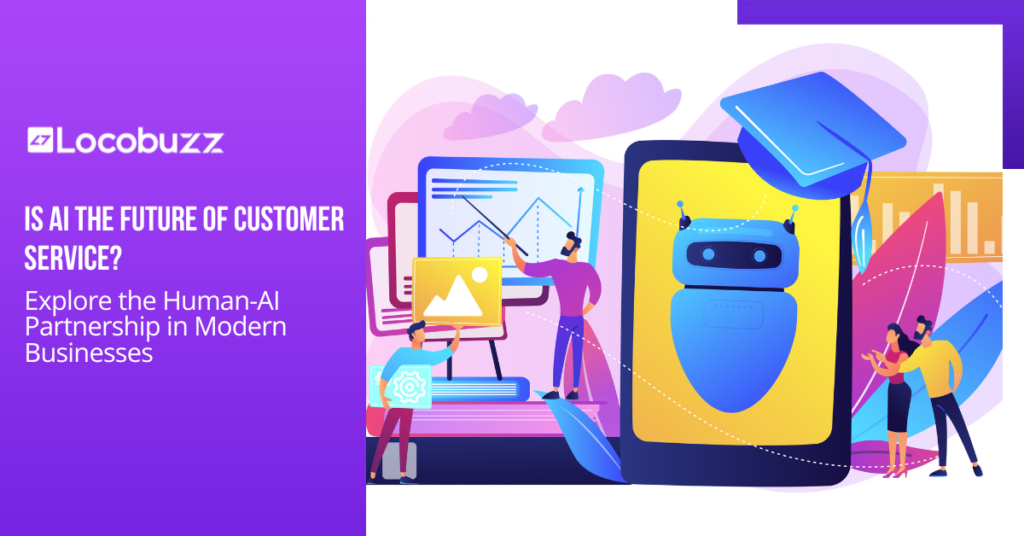Is AI the Future of Customer Service?

The intersection of AI and customer service is a topic of growing interest and debate in the modern business landscape. With the conversational AI market valued at $10.7 billion and expected to surge to $32.6 billion by 2030, its impact on customer service is profound.
This growth, fueled by a 270% increase in AI adoption by businesses over the past four years, reflects a shift towards integrating AI into customer interactions. AI’s role in automating routine tasks, offering 24/7 support, and handling large volumes of queries efficiently cannot be overstated. It also brings the potential for personalized customer experiences through data analysis and machine learning.
As businesses continue to navigate this evolving landscape, the question of whether AI will replace human elements in customer service remains a central and multi-dimensional inquiry.
Will customer service be replaced by AI?
AI is more likely to transform customer service rather than completely replace it. The future of customer service will probably involve a blend of AI and human interaction, Providing strengths of efficient, personalized, and empathetic customer support.
Satya Nadella, the CEO of Microsoft, has a positive and forward-looking view on the role of AI in our lives and work. He envisions AI as a tool that will augment and enhance human capabilities rather than replace them. According to Nadella, AI’s primary function will be to automate routine tasks, which will free up human time and energy for more creative and meaningful pursuits.
AI excels in automating routine tasks, handling large volumes of inquiries, and providing 24/7 service. Features like chatbots and virtual assistants can efficiently address common questions, freeing human agents for more complex issues that require empathy, creativity, and nuanced understanding.
AI also enhances customer service by providing personalized experiences and data-driven insights. However, it falls short in understanding intricate human emotions, cultural subtleties, and intricate problem-solving. Ethical and privacy concerns also play a role in determining the extent of AI integration.
Thus, the future of customer service is more about AI complementing human abilities rather than replacing them, striking a balance between technological efficiency and the irreplaceable human touch.
Customer service will likely not be entirely replaced by AI, but AI is increasingly being used to augment and enhance customer service operations. Here’s a breakdown of how AI interacts with customer service:
Automation of Routine Tasks
Personalization
24/7 Availability
Human-AI Collaboration
Limitations and Challenges
Despite its advancements, AI still struggles with understanding complex human emotions, cultural nuances, and intricate problem-solving that requires human empathy and creativity. Therefore, human agents are crucial for handling more complex, sensitive, or nuanced customer service situations.
Empathy and Human Touch: Empathy is a distinctly human trait that AI currently cannot replicate. In sensitive situations, such as dealing with an upset or distressed customer, the human ability to show empathy and understanding is crucial. AI lacks this personal touch, which is often necessary to effectively resolve complex issues and provide comfort to customers.
Adaptation and Customization: AI systems require continuous updates and adaptations to stay relevant and effective. This can be resource-intensive, and there’s always a lag in AI adapting to new products, services, or changes in company policy, unlike human agents who can adapt more quickly.
Creative Problem Solving: AI systems are typically designed to handle routine inquiries and are based on patterns and data. However, they are not adept at creative problem-solving, especially in situations that deviate from the norm or require out-of-the-box thinking. Human agents excel in such scenarios where a unique or innovative solution is needed.
Locobuzz: Bridging the gap between AI and Customer Service
AI-Driven Ticket Management System
- Locobuzz uses AI to streamline the ticket management process. This involves automatically categorizing, prioritizing, and routing customer queries to the appropriate departments or agents.
- AI algorithms can analyze incoming tickets based on content, urgency, customer history, and other parameters. This ensures that tickets are handled efficiently and by the most suitable agent, reducing response times and improving resolution rates.
Ticket Summarization
- AI in Locobuzz can condense the content of lengthy customer tickets into concise summaries. This helps agents to quickly grasp the main points and context of a customer issue without having to read through the entire text.
- Summarization improves efficiency and can also highlight key issues or recurring themes in customer queries, aiding in faster and more effective problem-solving.
ResponseGenie
- ResponseGenie is a notable feature of Locobuzz that automates responses to customer tickets based on the company’s knowledge base.
- It uses AI to understand the context of the customer query and then generates an appropriate response. This is particularly useful for handling routine questions or common issues, allowing human agents to focus on more complex or unique cases.
- The AI-driven responses are tailored to reflect the company’s tone, style, and specific policies, ensuring consistency and accuracy in customer communications.
Omnichannel Support
- Locobuzz provides an omnichannel platform, meaning it integrates customer communications from various channels like email, social media, chat, and more into a single interface.
- This unified approach ensures that customer interactions are seamlessly managed across all platforms, providing a consistent and continuous service experience.
- Omnichannel support also helps in tracking customer journeys, understanding their preferences, and providing a more personalized service.
Multilingual Mastery
Advanced Sentiment Analysis
- Locobuzz’s sentiment analysis goes beyond basic positive, negative, or neutral classifications. It can detect nuances in customer emotions and attitudes, providing deeper insights into customer satisfaction and expectations.
- This advanced analysis helps in identifying not just how customers feel about a product or service, but also why they feel that way, enabling more targeted and effective responses.
- By understanding customer sentiment in depth, businesses can tailor their strategies to improve customer engagement and loyalty.
Enhancing Customer Satisfaction through the Synergy of AI and Human CX
The synergy of AI and human interaction in customer service plays a crucial role in enhancing customer satisfaction. This blend leverages the strengths of both worlds – the efficiency and scalability of AI with the empathy and understanding of human agents.
Enhancing customer satisfaction in today’s market requires a nuanced approach that combines AI and human customer experience (CX) strategies. Firstly, understanding your customers’ pain points is crucial.
This insight allows for more empathetic interactions, where human agents can provide the understanding and care that AI cannot. Speed and efficiency are also key; AI excels here by handling routine queries quickly, freeing human agents to tackle more complex issues.
Rather than viewing technology and AI as adversaries, businesses should embrace them as tools to enhance service, using AI to handle simple tasks while aiming to delight customers with personalized, thoughtful interactions.
Monitoring your Customer Satisfaction (CSAT) score is vital in this process, providing valuable feedback that can guide continuous improvement.
By striking the right balance between technological efficiency and the human touch, businesses can create a customer service experience that not only resolves issues but also builds lasting customer loyalty and satisfaction.

















